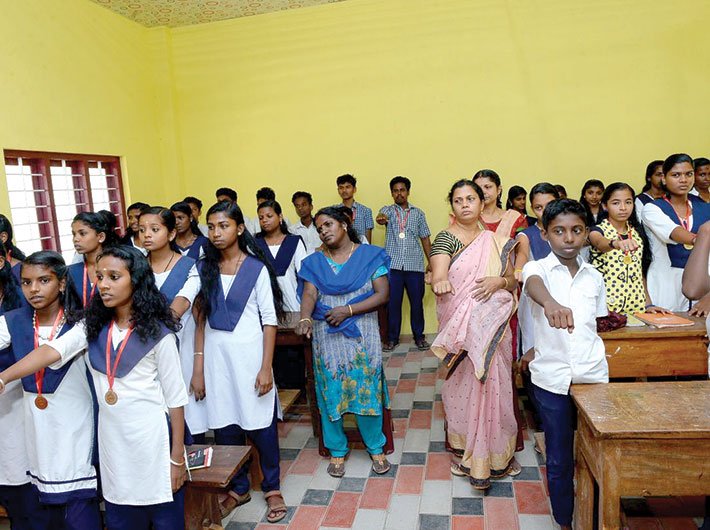A unique healthcare effort in Kerala’s Alappuzha district is doing wonders by roping in children
Sneha Sena is a unique attempt to integrate education and healthcare by bringing school children into the field of palliative care.
In Kerala’s Alappuzha district, a government medical officer has decided to create an army of student volunteers to be part of the government’s pain and palliative care programme.
As part of the government policy, every primary health centre (PHC) is supposed to have teams of doctors and health workers who visit homes of bedridden or terminally ill patients who need home-based care. The doctors are from allopathic, ayurvedic and homoeopathic streams of medicine.
This is being implemented all over the state and the patients are allowed to choose between allopathy and ayurveda treatment. In Alappuzha, a medical officer Dr Nisha NT has further given a boost to this effort by roping in students in the programme.
How it all start?
Dr Nisha was posted in Kandallur in Alappuzha district. This was one of the two panchayats where ayurvedic palliative care was introduced by the government in 2017.
Dr Nisha decided to give a novel twist to the treatment. She wanted the patients to feel that they were part of the family and not dependents, as most bedridden patients feel.
So in 2017, on the day of Onam, when the whole state was celebrating, Dr Nisha launched the palliative care programme with medicinal plants in her dispensary and offered Ona pudava or new clothes to the patients of palliative care. Children from the families of palliative care patients were also involved in this initiative. And it was like a big family gathering.
After a few months, one of the palliative care patients, Pankajiakshiamma, fell and needed surgery. She was old and not hopeful of surviving. So she told her daughter that when she dies she wants to be wrapped in the same clothes that we were given to her on Onam.
Pankajiakshiamma’s last wish touched Dr Nisha and she felt that her instinct was right. Palliative care was more about feeling cared and feeling part of the family.
“I was touched by that incident and decided that palliative care henceforth was going to be about affection and not just medicines,” she says.
Soon another incident happened which made her rethink her strategy. There was a family of mother and son. The son was alcoholic and incapable of doing anything, while his mother lay in filth, bedridden.
The mother was transferred to an old-age home. “But we still felt that something was missing,” she says.
In another case, there was a 45-year-old male patient who was paralysed. His fingers needed to be massaged daily. But both his parents were old and asthmatic.
“Who would take care of him every day? We had just one sister and one attendant,” Dr Nisha says.
“Then I thought that I needed an army of people from various families in the community to take care of palliative care patients. So I turned to the schools around me. That was the beginning of Sneha sena,” she adds.
A social change was needed; just giving medicines would not change anything. There was a need to change the approach of families. “It is our responsibility to take care of our elders. And this has to be cultivated in children if we want them to grow up as responsible adults,” says Dr Nisha. The patients need mental relaxation, and even if they are bedridden they need relief from loneliness, she adds.
Therefore, involving school children seemed like a good idea. “Kids will talk or play with the patients, listen to their stories, and so on. This was what I wanted,” says Dr Nisha.
But before this, students were given training in primary healthcare in their schools. A lecture on palliative care was given to students and after that about 30 students from the only higher secondary school in Kandallur came forward to volunteer as members of Sneha sena.
Interestingly, a drawing activity was held for the children and they were asked to draw what they thought of palliative care. “The ideas they drew were very moving and made me look at things with new eyes,” she says.
Finally before the academic year came to an end this year, Dr Nisha set off for her first trip with the kids. Two of them were going for their first-ever trip to a patient’s home. They were able to visit two homes and it was more like a demonstration trip for the students. Usually Dr Nisha and her two assistants cover 10 homes of bedridden patients daily.
Dr Nisha as well as the students are excited about their activities after the school reopens in June. “We have divided activities for the team into identifying patients in their neighbourhood and going and talking to them,” she says.
The students would usually visit the patients on holidays or Saturdays. In some cases they would visit every day. There are some patients who are paraplegic and have nobody to give them medicines on time. Their family/relatives go out in morning for work, locking them inside the house. “In such cases, we would usually go from the kitchen door to give them medicine,” says Dr Nisha.
“But now we can depend on boys living in the neighbourhood to go and give them medicine once a day,” she adds.
Dr Nisha’s idea to rope in children is already a hit in the state. There have been enquiries from Kannur and Ernakulam districts to replicate the idea.
Dr Sheela Karlam who is the district medical officer of neighbouring Thrissur is all praise for Dr Nisha’s energy and the uniqueness of her concept.
Dr Karlam has embraced the palliative care scheme Snehadhara as one of her pet projects in the district. She says that Dr Nisha has given a new direction to her. “It is a possibility one must explore. She has definitely taken a bold initiative. We can’t deny that experience is the best education. And here the children would learn to look after their own aged relatives in a more empathetic way.” says Dr Karlam.
feedback@governancenow.com
(The article appears in May 31, 2018 edition)

